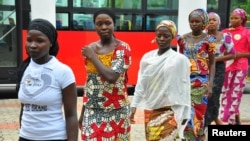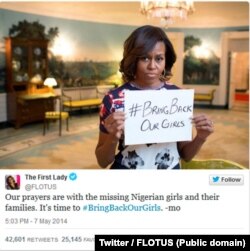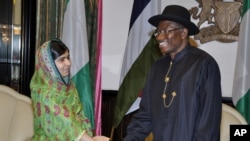Nigerians are marking the 100th day since more than 200 girls were kidnapped from their schoolhouse in the war-torn northeast. While the abduction sparked international outrage and support, the girls appear to be no closer to home than they were 100 days ago.
In five years of Boko Haram insurgency and thousands of deaths in northeastern Nigeria, no crime has angered people in other parts of the country and around the world like the kidnapping of the girls on April 14.
Two weeks after the abduction, on a rainy afternoon, activists in Nigeria took to the streets demanding the immediate rescue of the girls. Michelle Obama and Angelina Jolie expressed support for the movement that later became known as Bring Back Our Girls and countries around the world pledged to help.
Two months after the abduction, rallies continued almost every day and U.S. lawmakers visited Nigeria, adding their voices to the call for the girls’ rescue.
“Mothers and sisters, wives, girls, grandmothers and all of the men, we stand with the men, are pleading for the release of these girls and it is not too late,” said Congresswoman Federica Wilson.
Pakistani activist Malala in Nigeria
Three months after the abduction, Pakistani girls education activist Malala Yousafzai came to Abuja to speak with Nigerian President Goodluck Jonathan, who told her his government was doing everything possible to find the girls.
“There are some difficulties, which he mentioned, such as that it is quite difficult to do a military operation as these girls can be targeted. There is an idea of swapping, but it is a quite complicated situation to understand,” she said.
She says the president promised to rescue the girls “as soon as possible."
Few information
And 100 days after the abduction, the public still knows nothing certain about the girls' condition or their whereabouts.
The only information comes from Boko Haram's leader, who said in a video they are being held captive as “slaves” and will not be returned unless the government swaps imprisoned militants for girls.
"The sadder thing is the conversation between the citizens and our government leaves a lot to be desired. Leaves a lot to be desired,” says Obi Ezekwelizi, one of the leaders of Bring Back Our Girls.
Activists say they plan to continue near daily “sit-outs” in Abuja until the girls are rescued. But the group and the kidnapped girls are also now in the center of Nigerian politics, with the government accusing Bring Back Our Girls of being agents of the opposition.
Optimism and fear
In a statement, organizers of the Bring Back Our Girls social media campaign said the families and communities of the abducted girls had "suffered deep anguish [and are] seeking effective rescue to end peril that befell their daughters."
Ahead of Wednesday's events, organizer Bukky Shonibare expressed optimism that the girls would be freed soon.
"We believe that anything can happen swiftly, so if there is anything we expect from the president... it is for our girls to return now so that instead of commemorating day 100, we all come out jump on the street, dance and celebrate the gallant return of our girls," she said.
The rallies are taking place a day after Nigerian President Goodluck Jonathan held his first meeting with some of the parents of the kidnapped girls, along with some of the girls who managed to escape.
After the closed-door meeting in Abuja, presidential spokesman Reuben Abati said Jonathan repeated his pledge to rescue the girls.
Esther Yakubu, the mother of one of the abducted girls, said the Chibok community has been living in fear since the kidnappings.
"Those that have wealth a bit, they leave entirely the Chibok land to another place to hide their life, but we that are poor we are the ones living there," she said.
In a statement, Bring Back Our Girls said its events on Wednesday include a "remembrance service" in Lagos and a candlelight vigil at the Nigerian consulate in New York.
Some information for this report comes from Reuters.








